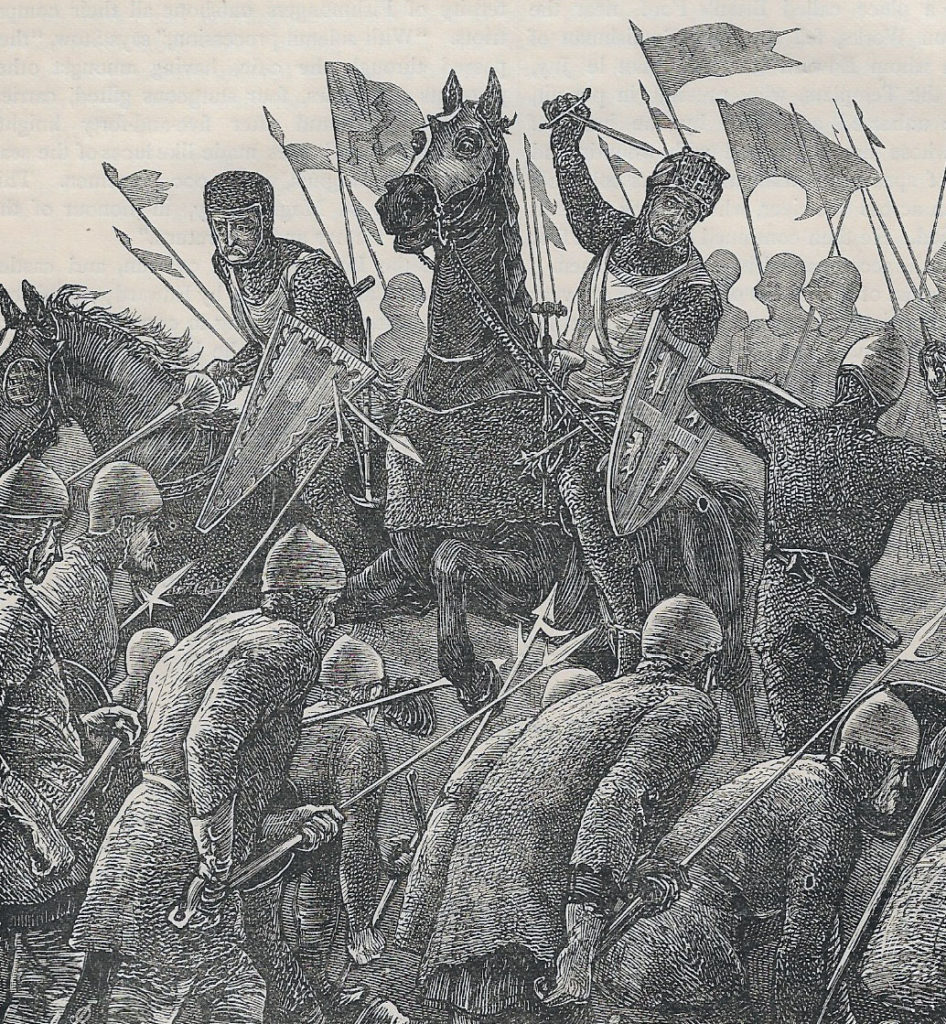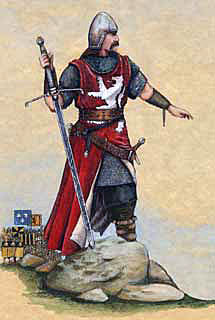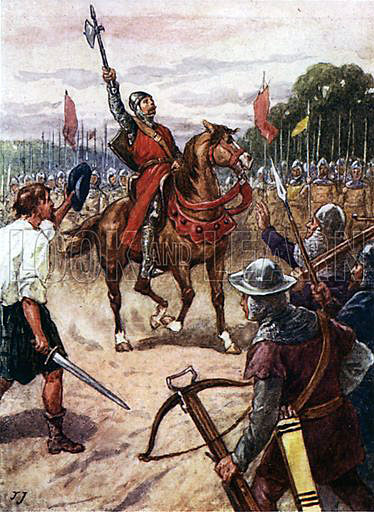King Edward I’s resounding defeat of William Wallace’s Scots army on 22nd July 1298
The previous battle of the Hundred Years War is the Battle of Stirling Bridge
The next battle in the British Battles series is the Battle of Bannockburn
To the Scottish Wars of Independence index
War: The Scottish Wars of Independence.
Date of the Battle of Falkirk: 22nd July 1298
Place of the Battle of Falkirk: Central Scotland.
Combatants at the Battle of Falkirk: An English army against a Scots army.
Commanders at the Battle of Falkirk: King Edward I commanded the English army.
William Wallace, as the Guardian of Scotland, claimed to command the Scots army, but this claim was disputed by Sir John Stewart and Comyn.
Size of the armies at the Battle of Falkirk: As with all battles of this period there is controversy over the size of each army.
Some estimates put the English army as large as 50,000 men with the Scots army numbering around 20,000.
This is most unlikely.
Probably the English army numbered around 8,000 knights and men-at-arms with around 10,000 foot soldiers including English and Welsh archers.
The Scottish army probably number around 12,000 horse and foot, mainly spearmen, with some archers.
Uniforms, arms and equipment at the Battle of Falkirk: The English knights wore chain mail reinforced with steel elbow and knee pieces and steel helmets. They fought with spears, shields, maces, and swords.
The wealthier knights and nobles were beginning to acquire steel plate armour in place of chain mail.
The English infantry carried a wide range of weapons; spears, maces, swords and daggers. The wealthier among them wore items of chain mail or leather jerkins and steel helmets.
The Scottish knights were armed much as their English opponents.
The mass of Scottish infantry carried spears, swords and daggers.
There were archers on each side in the infantry, although the bow was not the primary battle weapon for the English it was to become in the next century.
Winner of the Battle of Falkirk: The Scottish army was heavily defeated and dispersed, forcing Wallace to return to a life of guerrilla warfare against the English.
Events leading to the Battle of Falkirk:
Edward commanded the army with Anthony de Beck, the ‘Fighting’ Bishop of Durham, Humphrey de Bohun, Earl of Hereford and Essex and High Constable of England, Bigod, Earl of Norfolk, the Chief Marshal; the Earl of Lincoln and Radulf, Lord Bassett de Drayton.
Following the heavy defeat of the English army commanded by John de Warenne, 6th Earl of Surrey, at the Battle of Stirling Bridge on 11th September 1297, King Edward I returned from France and ordered the northern English nobles to assemble with their retinues in late May 1298 at York to invade Scotland.
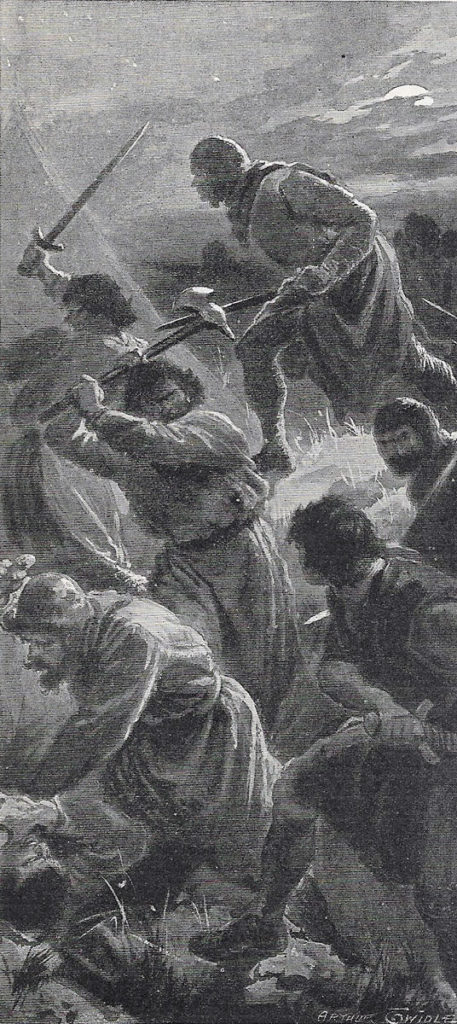
Before agreeing to march against the Scots, the English barons attempted to make King Edward swear to observe the Magna Carta, an obligation King Edward evaded, saying that once the Scots were defeated, he would take the oath.
In June 1298 the English army entered Scotland by the eastern route.
Edward reviewed his army at Roxburgh.
the cavalry comprised a force of 3,000 heavily armoured cavalry and 4,000 light cavalry with 500 Gascon knights and men-at-arms.
Edward marched north through the Lothians, before halting for a month at Kirkliston to await his supplies arriving by sea.
In the meantime, William Wallace assembled the Scots army and marched to Falkirk where he intended to give battle to King Edward.
It is said that many of the Scottish noblemen refused to serve under William Wallace and were not present at the Battle of Falkirk.
A dispute arose in Edward’s camp between his English and Welsh contingents which led to fighting between the two national groups, the Welsh threatening to leave the army and join the Scots.
Wallace took the opportunity to organise a night attack on the English camp, but his plans were disclosed to Edward by Gilbert de Umfraville, Earl of Angus and Patrick, Earl of Dunbar.
To forestall Wallace, Edward marched his army to Linlithgow, prior to launching an attack on the Scots army in the forests of Falkirk.
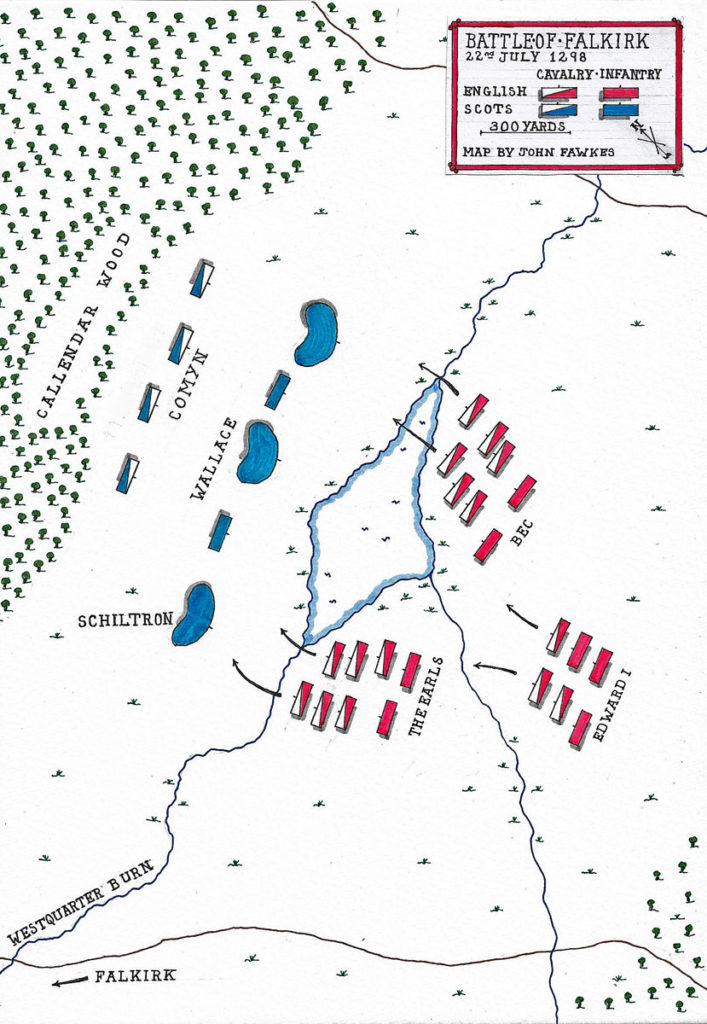
Account of the Battle of Falkirk:
The English army camped for the night of 21st July 1298 in the open fields without tents or supplies.
The king slept in his armour by his horse, as did all the men-at-arms.
In the night the king’s destrier was disturbed and trampled on the king, breaking three of his ribs and crushing part of his armour.
Hearing the king crying out there were cries of ‘Treason. The Scots are upon us.’
Edward mounted and rode through the army reassuring the soldiery that he was safe.
The English army began its march towards the Falkirk Forest, the town itself visible above the trees.
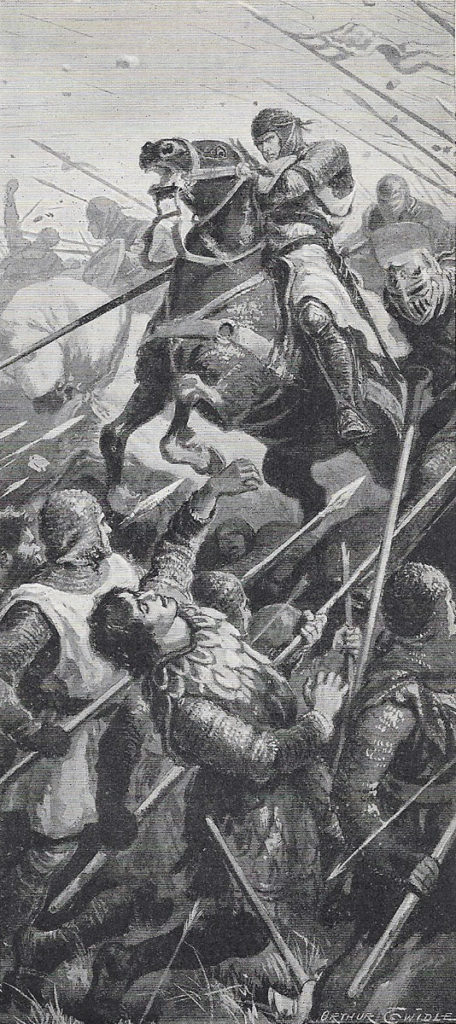
A party of Scots men-at-arms was surprised by the advancing English and fell back on the main body of Scots.
The English army halted and Andrew de Bec, Bishop of Durham, celebrated mass from the back of his horse.
The Scots army was drawn up before them.
The mass of Scots pikemen was clustered in three ‘Schiltrons’, pikes against their right foot with the points outwards towards the advancing English.
The Scots archers, commanded by Sir John Stewart, stood in clumps between the Schiltrons,
The Schiltrons were commanded by Sir John Graham of Abercorn and Duncan McDuff, eleventh Earl of Fife.
The reserve was formed of mounted men-at-arms under John Comyn of Badenoch.
While the English army was celebrating mass, a dispute arose in the Scottish ranks as to who should lead the army.
Sir John Stewart claimed to lead the Scots by virtue of his relationship to his brother, the hereditary Lord High Steward of Scotland.
Comyn claimed the honour by virtue of his descent from King David.
Wallace as the legally authorised guardian of the country insisted on his right to lead the Scots army.
While this dispute raged the English launched their attack.
In front of the Scots position was an area of inundation caused by the junction of two burns or streams.
The left wing of the English first line, led by the Earls of Lincoln and Hereford swerved around the end of the area of inundation and charged the Schiltrons on the right of the Scots army.
The English men-at-arms were unable to penetrate the ranks of spears of the Scots Schiltrons and were subjected to a galling fire by the Scots archers.
On the other flank the Bishop of Durham led his division around the inundation and halted before the left hand Schiltron, before launching his attack.
In the Scottish rear John Comyn, affronted at the failure of his claim to command the army, took this opportunity to leave the battlefield with his men-at-arms, abandoning the Scots Schiltrons to the English attack.
The English and Welsh archers of the king’s reserve came up and subjected the Scots spearmen and archers to a damaging fire that broke up the Schiltron formations.
The Scots infantry began to flee the battlefield, pursued by the English men-at-arms.
It is said that Wallace fought on with his two-handed sword until night-fall, when he turned and rode off on his much-wounded horse.
The horse carried Wallace across the River Carron before collapsing, leaving Wallace to escape on foot.
Casualties at the Battle of Falkirk:
Casualties at the battle are uncertain, but it seems likely that several thousand of the Scots spearmen and archers were killed during the attacks on the Schiltrons and in the subsequent pursuit by the mounted English men-at-arms.
Sir John Stewart, Sir John Grahame of Dundaff and the Earl of Fife were killed with many of their vassals.
English casualties were probably in the hundreds, mostly from the fire of the Scots archers during the attacks on the Schiltrons.
The only Englishman of distinction killed in the battle is said to have been Sir Brian le Jay, the Master of the Templars.
Follow-up to the Battle of Falkirk:
With the defeat of the Scots army King Edward I resumed his subjugation of Scotland.
With his army dispersed, William Wallace resumed his life of guerrilla warfare against the English, the form of warfare that suited his talents and personality.
Finally, Wallace was betrayed to the English. He was taken in chains to London, tried in Westminster for treason and hanged, drawn and quartered in Smithfield in 1305.
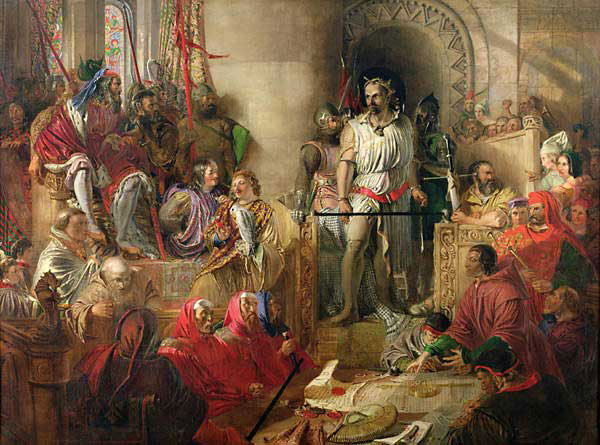
Anecdotes and traditions from the Battle of Falkirk:
- When the Bishop of Durham halted after passing the inundation, he was harangued by Sir Radulf Basset who called out ‘Stick to thy mass, thou Lord Bishop; we shall conduct the military operations this day!’ The bishop immediately spurred into the attack.
References for the Battle of Falkirk:
British Battles by Grant.
Battles in Britain 1066-1547 by William Seymour.
The Art of War in the Middle Ages Volume Two by Sir Charles Oman
The previous battle of the Hundred Years War is the Battle of Stirling Bridge
The next battle in the British Battles series is the Battle of Bannockburn
To the Scottish Wars of Independence index
